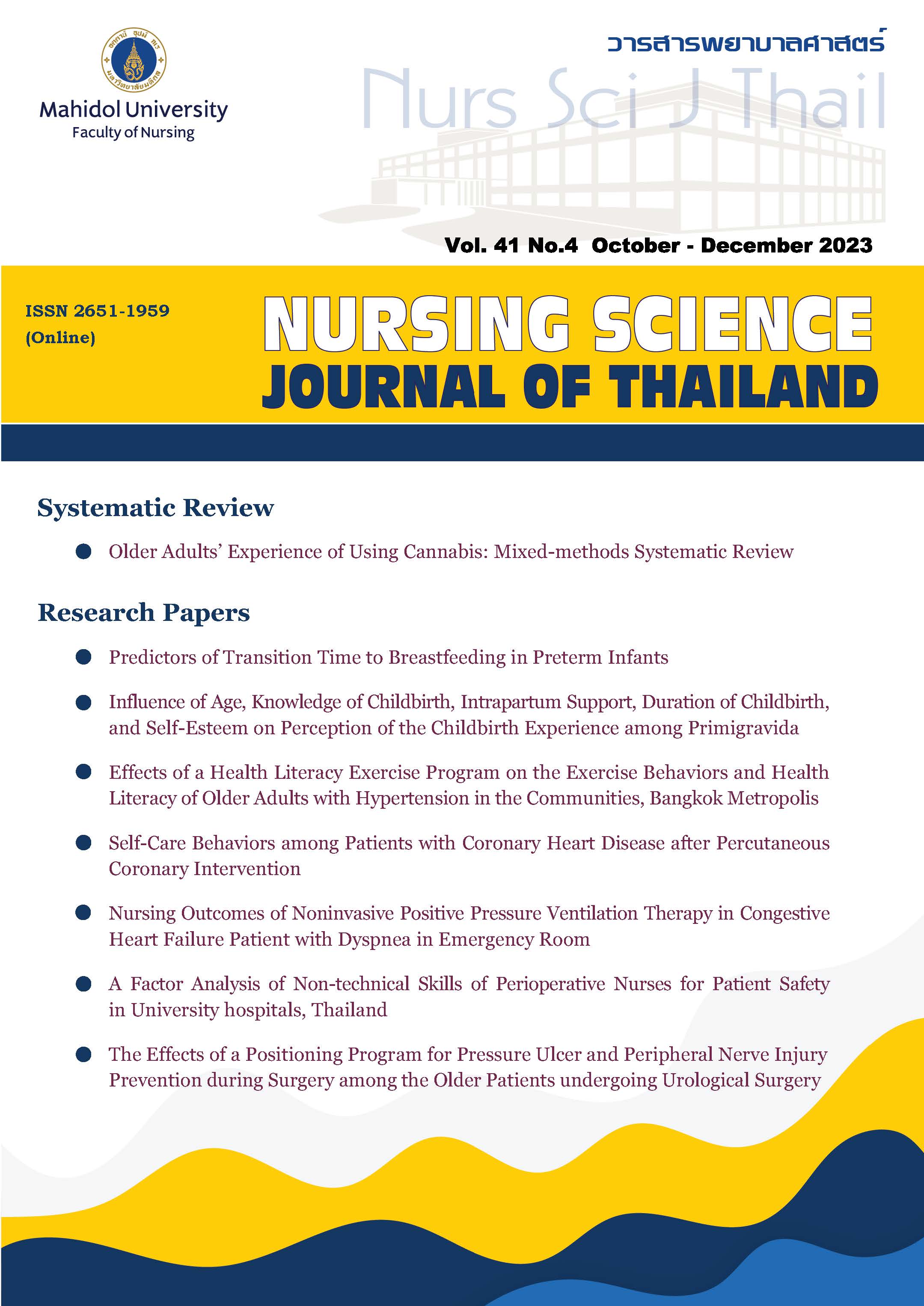A Factor Analysis of Non-technical Skills of Perioperative Nurses for Patient Safety in University Hospitals, Thailand
Main Article Content
Abstract
Purpose: This research aimed to analyze the factors of non-technical skills of perioperative nurses needed for patient safety.
Design: Descriptive Design.
Methods: The sample comprised 450 perioperative nurses, selected by a simple random sampling technique from 5 university hospitals in Thailand. Data were collected using the non-technical skills of perioperative nurses for patient safety questionnaire which was originally developed using the Delphi technique. Certain items were modified and the content validity was approved by 5 experts yielding an I-CVI of .80-1. The internal consistency was tested yielding a Cronbach's alpha coefficient of 0.96. The data were analyzed using exploratory factor analysis using principal components analysis and varimax orthogonal rotation.
Main findings: The research found that non-technical skills of perioperative nurses needed for patient safety had 8 principal components with a total variance explained of 62.5%. The first three components with the highest variance were namely leadership (14%), teamwork (10.1%), and planning and safety communication (10.1%).
Conclusion and recommendations: Technical skills and non-technical skills are important for professional nurses to deliver quality and safe nursing services. The results of this research can be used for further development of an assessment tool and a guidance for non-technical skills of perioperative nurses for patient safety outcomes.
Article Details

This work is licensed under a Creative Commons Attribution-NonCommercial-NoDerivatives 4.0 International License.
Copyright Notice: Nursing Science Journal of Thailand has exclusive rights to publish and distribute the manuscript and all contents therein. Without the journal’s permission, the dissemination of the manuscript in another journal or online, and the reproduction of the manuscript for non-educational purpose are prohibited.

Disclaimer: The opinion expressed and figures provided in this journal, NSJT, are the sole responsibility of the authors. The editorial board bears no responsibility in this regard.
References
Phanthusat N, Thongyu R. Nursing practice guidelines according to patient safety standards. Thai Red Cross Nursing Journal. 2017;10(2):1-13. (in Thai).
Supachutikul A. Safe surgery. Thammasat Medical Journal. 2012;12(4):797-9. (in Thai).
Vargas M, Servillo G. The World Health Organisation surgical safety checklist does not reduce mortality in general surgery. Br J Anaesth. 2018;120(5):1135-7. doi: 10.1016/j.bja.2018.02.003.
Bunditlerdrak C, Thiangchanya P, Boonyang N. Effective collaboration in operating rooms of university hospitals in Thailand. The Southern College Network Journal of Nursing and Public Health. 2022;9(1):186-98. (in Thai).
Kumnum S, Hinjiranan S, Meehanpong P. The administrative and service competencies of operating room head nurses at a secondary-level hospital using the Delphi technique. Nursing Journal of The Ministry of Public Health. 2022;32(1):56-73. (in Thai).
Suwatno R, Wivatvanit S, The effect of teamwork for adverse events prevention program in surgical operating theater on work effectiveness. Journal of Nursing Science Chulalongkorn University. 2015;27(3):146-55. (in Thai).
Weiser TG, Regenbogen SE, Thompson KD, Haynes AB, Lipsitz SR, Berry WR, et al. An estimation of the global volume of surgery: a modeling strategy based on available data. Lancet. 2008;372(9633):139-44. doi: 10.1016/S0140-6736(08)60878-8.
Torring B, Gittell JH, Laursen M, Rasmussen BS, Sorensen EE. Communication and relationship dynamics in surgical teams in the operating room: an ethnographic study. BMC Health Serv Res. 2019;19(1):528. doi: 10.1186/s12913-019-4362-0.
Siwawut J, Thiangchanya P, Thongsuk P. Non-technical skills of perioperative nurses for patient safety in tertiary hospital, Thailand. Nursing Journal. 2020;47(4):458-69. (in Thai).
Gillespie BM, Harbeck E, Kang E, Steel C, Fairweather N, Chaboyer W. Correlates of non-technical skills in surgery: a prospective study. BMJ Open. 2017;7(1):e014480. doi: 10.1136/bmjopen-2016-014480.
Kongsuwan W, Sirihorachai R, Kunalasiri T, Tongbunkular M, Wianchai W. Non-technical skills of operating room nurses in university hospital. Nursing Science Journal of Thailand. 2019;37(4):42-53. (in Thai).
Watkins MW. Exploratory factor analysis: a guide to best practice. J Black Psychol. 2018;44(3):219-46. doi: 10.1177/0095798418771807.
Reason J. Human error: models and management. BMJ. 2000;320(7237):768-70. doi: 10.1136/bmj.320.7237.768.
Ausawapoom S. Risks and risk management. Journal of Ratchathani Innovative Social Sciences. 2018;2(3):1-11. (in Thai).
Rojanatrakul T. Creative conflict management. The Academic Journal: Faculty of Humanities and Social Sciences Nakhonsawan Rajabhat University. 2019;6(2):69-83. (in Thai).
Gross B, Rusin L, Kiesewetter J, Zottmann JM, Fischer MR, Pruckner S, et al. Crew resource management training in healthcare: a systematic review of intervention design, training conditions and evaluation. BMJ Open. 2019;9(2):e025247. doi: 10.1136/bmjopen-2018-025247.


